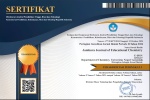LKM Berbasis Inkuiri Terbimbing Untuk Meningkatkan Pemahaman Konseptual dan Motivasi Belajar Kimia
Abstract
Keywords
Full Text:
PDFReferences
Abelta, G., Ertikanto, C., & Wahyudi, I. (2017). Pengaruh Penggunaan Lks Berbasis Inkuiri Terbimbing Terhadap Hasil Belajar Melalui Pemahaman Konsep. Jurnal Pembelajaran Fisika Universitas Lampung, 5(2), 93-104.
Arifin, U. ., Hadisaputro, S., & Susilaningsih, E. (2015). Pengembangan Lembar Kerja Praktikum Siswa Terintegrasi Guided Inquiry Untuk Keterampilan Proses Sains. Chemistry in Education, 4(1), 54-60.
Chang, R., & Jason, O. (2022). Chemistry 14th Edition. McGraw-Hill.
Creswell, J. W. (2014). Research Design Qualitative, Quantitative, and Mixed Methods Approaches (Fourth Edi). SAGE Publication, Inc. https://www.m-culture.go.th/mculture_th/download/king9/Glossary_about_HM_King_Bhumibol_Adulyadej's_Funeral.pdf
Duran, M., & Dökme, I. (2016). The effect of the inquiry-based learning approach on student's critical-thinking skills. Eurasia Journal of Mathematics, Science and Technology Education, 12(12), 2887-2908. https://doi.org/10.12973/eurasia.2016.02311a
Eilks, I., Gulacar, O., & Sandoval, J. (2018). Exploring the Mysterious Substances, X and Y: Challenging Students' Thinking on Acid-Base Chemistry and Chemical Equilibrium. Journal of Chemical Education, 95(4), 601-604. https://doi.org/10.1021/acs.jchemed.7b00404
Eilks, I., & Hofstein, A. (2015). Relevant Chemistry Education, From Theory to Practice. Sense Publisher.
Halimah, S. N., Rudibyani, R. B., & Efkar, T. (2015). Penerapan Model Inkuiri Terbimbing dalam Meningkatkan Motivasi Belajar dan Penguasaan Konsep Siswa. Jurnal Pendidikan Dan Pembelajaran Kimia, 4(3), 997-1010.
Herunata, & Kholilah, N. (2021). Profile Of Polya'S Problem-Solving Abilities Model Among Senior High School Students : Lesson From Stoichiometric Class. Jurnal Pembelajaran Kimia, 6(2), 87-99.
Lestari, N., Basri, I., Yusuf, S. M., Suciati, & Masykuri, M. (2019). Effect of Interactive Multimedia Based on PBL on Critical Thinking Ability and Science Literacy VII Junior High School Student at Kupang. 6th ICRIEMS Proceedings, BE1-BE8.
Mahdi, J. G. (2014). Student Attitudes towards Chemistry: an Examination of Choices and Preferences. American Journal of Educational Research, 2(6), 351-356. https://doi.org/10.12691/education-2-6-3
Oktavianti, M., & Nugrahaningsih, W. (2021). Guided Inquiry Learning Berbantuan Lembar Kerja Praktikum Siswa (LKPS) Dalam Upaya Meningkatkan Pemahaman Konsep Pada Pembelajaran Sistem Gerak Manusia. Prosiding Semnas Biologi Ke-9 FMIPA Universitas Negeri Semarang, 141-147.
Prahani, B. K., Limatahu, I., Soegimin, W. ., Yuanita, L., & Nur, M. (2016). Effectiveness of Physics Learning Material Through Guided Inquiry Model To Improve Student's Problem Solving Skills Based on Multiple Representation. International Journal of Education and Research, 4(12), 231-242.
Sadeh, I., & Zion, M. (2012). Which Type of Inquiry Project Do High School Biology Students Prefer: Open or Guided? Research in Science Education, 42, 831-848. https://doi.org/10.1007/s11165-011-9222-9
Saija, M., Rahayu, S., Budiasih, E., & Fajaroh, F. (2021). Empowering Students ' Worksheet with SSI to Improve the Conceptual Understanding of Rate Reaction and Thermochemistry. Advances in Social Science, Education and Humanities Research, 528, 231-237. https://doi.org/https://dx.doi.org/10.2991/assehr.k.210305.034
Saija, M., Sahureka, M., Beay, L. K., & Namakule, U. (2019). Keefektifan Program Pembelajaran Kimia Dasar : Evaluasi Model CIPP Pada Jurusan MIPA STKIP Gotong Royong Masohi. Jambura Journal of Educational Chemistry, 1(2), 57-62. https://doi.org/10.34312/jjec.v1i2.2534
Solissa, D. M., & Saija, M. (2017). Penerapan Metode Pembelajaran Problem Solving untuk Meningkatkan Hasil Belajar Peserta Didik Kelas X SMA Negeri 2 Kecamatan Sirimau Kota Ambon. Jurnal Pedagogika Dan Dinamika Pendidikan, 5(2), 132-144.
Stojanovska, M. I., Soptrajanov, B. T., & Petrusevski, V. M. (2012). Addressing Misconceptions about the Particulate Nature of Matter among Secondary-School and High-School Students in the Republic of Macedonia. Creative Education, 3(5), 619-631.
Suryandari, Sunarno, W., & Suparmi. (2016). Pengembangan Media Pembelajaran Menggunakan Video Dokumenter Berbasis Inkuiri Terbimbing Berorientasi Pada Motivasi Belajar Siswa. Jurnal Inkuiri, 5(1), 85-94.
Taber, K. S. (2018). The Use of Cronbach ' s Alpha When Developing and Reporting Research Instruments in Science Education. Research in Science Education, 48(6), 1273-1296. https://doi.org/10.1007/s11165-016-9602-2
Ummaeroh, R., Gusmania, Y., & Hasibuan, N. H. (2019). Pengaruh Penggunaan LKS Berbasis Inkuiri Terhadap Pemahaman Konsep Matematis Siswa Kelas XI IPA SMA. PYTHAGORAS: Jurnal Program Studi Pendidikan Matematika, 8(2), 93-98. https://doi.org/10.33373/pythagoras.v8i2.1998
Wibowo, N. (2016). Upaya Peningkatan Keaktifan Siswa Melalui Pembelajaran Berdasarkan Gaya Belajar Di Smk Negeri 1 Saptosari. Elinvo (Electronics, Informatics, and Vocational Education), 1(2), 128-139. https://doi.org/10.21831/elinvo.v1i2.10621
Widiyatmoko, A., & Shimizu, K. (2018). An overview of conceptual understanding in science education curriculum in Indonesia. IOP Conf.Series: Journal of Physics: International Conference on Mathematics, Science and Education 2017, 1-6
DOI: https://doi.org/10.34312/jjec.v4i1.13492
Refbacks
- There are currently no refbacks.
Editorial Office

|
Department of Chemistry, Universitas Negeri Gorontalo |

|
E-mail: [email protected] |

|
|

|
Jambura Journal of Educational Chemistry (p-ISSN: 2655-7606 | e-ISSN: 2656-6427) by Department of Chemistry Universitas Negeri Gorontalo. This work is licensed under a Creative Commons Attribution 4.0 International License. Powered by Public Knowledge Project OJS |










